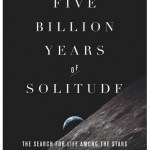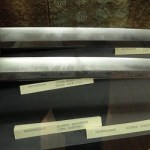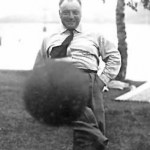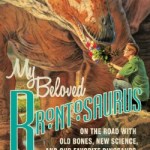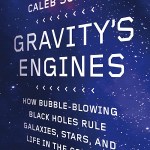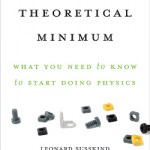Science Books
In October 1988, I trashed my parents' basement in order to get into college.
OK, the causal connection is a little indirect, but it's there. I was applying to college that fall, and needed to write an essay to go with my application. I've always been able to write stuff with very little effort, so I banged out something that I thought was adequate, and showed it to my guidance counselor, who said "No way." My parents backed her up on this, and I had to go write another one.
The problem was that while what I had written was reasonably polished, it was also glib and superficial-- because I'm…
It's taken me a disgracefully long time to finish the review copy of Lee Billings's Five Billion Years of Solitude I was sent back in the fall, mostly because I didn't read anything not immediately related to the book-in-progress for most of November and all of December. Which is to say, the long delay is not in any way a reflection of the quality of this book, which is excellent.
The title comes from the observation that the span from when life arose on Earth to the distant future when the expanding Sun will swallow the planet entirely is around five billion years. The span when the planet…
I sent off the complete draft of the book-in-progress yesterday, somewhere between 12 and 36 hours ahead of my contractual deadline. Which I suppose makes it a book-in-process now, maybe. That process may still include re-writes, though, so my work probably isn't done yet.
The final draft, according to Word anyway, comes to 253 pages (space-and-a-half) and 96,807 words. I don't remember the word count from the original contract, but this is more than that. Which is pretty typical of my writing, really.
Because I wrote it down as part of the final checks, here's the approximate table of…
I'm sure I've done more than enough wibbling about TED for this week, but the only major physics story at the moment involved the Higgs boson, and I'm thoroughly sick of that. So let's talk about Malcolm Gladwell and journosplaining.
Gladwell has a new book out, David and Goliath that from all reports is pretty much exactly what you expect from a Malcolm Gladwell book. I greatly enjoyed the digested read by John Crace in the Guardian. Among the many bad reviews of this were a trio by my colleague at Union, Christopher Chabris-- first a paywalled review in the Wall Street Journal, then a post…
One of the chapters of the book-in-progress talks about neutrino detection, drawing heavily on a forthcoming book I was sent for blurb/review purposes (about which more later). One of the little quirks of the book is that the author regularly referred to physicists trying to "trap" neutrinos. It took me a while to realize that he just meant "detect"-- coming from the AMO community, I naturally assume that "trap" means "localize to a small-ish region of space for a long-ish period of time." That is, after all, what I spent my Ph.D. work doing-- trapping cold atoms.
SteelyKid had a rough…
The stupid Steven Pinker business from a few weeks ago turned out to do one good thing after all. It led to this post at Making Science Public, which quoted some books by Jacob Bronowski that sounded relevant to my interests. And, indeed, on checking The Common Sense of Science out of the college library, I opened it up to find him making one of the arguments of my book for me:
Many people persuade themselves that they cannot understand mechanical things, or that they have no head for figures. these convictions make them feel enclused and safe, and of course save them a great deal of trouble…
Via a retweeted link from Thony C. on Twitter, I ran across a blog post declaring science a "bourgeois pastime." The argument, attributed to a book by Dierdre McCloskey is that rather than being at the root of economic progress, scientific advances are a by-product of economic advances. As society got more wealthy, it was able to direct more resources to science, which made great advances possible.
And, you know, if you're looking to make a bold and contrarian argument, you can certainly do that. Unfortunately, the bit quoted from McCloskey as an illustration of the power of the argument is:…
I've got a ton of stuff that needs to get done this week, but I don't want the blog to be completely devoid of new content, so here's a quasi-poll question for my wise and worldly readers:
What scientist is most in need of a good popular biography?
By "popular biography," I mean things like Norton's Great Discoveries books, several of which Ive reviewed here, including Krauss on Feynman and Reeves on Rutherford, two books that I keep coming back to for useful tidbits. These aren't deep works of historical scholarship, and don't necessarily attempt to be definitive, but focus on being…
A little while back, I posted about the pro-theorist bias in popular physics, and Ashutosh Jogalekar offers a long and detailed response, which of course was posted on a day when I spent six hours driving to Quebec City for a conference. Sigh.
Happily, ZapperZ and Tom at Swans On Tea offer more or less the response I would've if I'd had time and Internet connectivity. Tom in particular gives a very thorough exploration of some of the reasons why experiment gets downplayed in popular physics. I particularly liked this bit:
I’m going to put forth a possibility: maybe we have a harder job, in…
Rhett at Dot Physics departed ScienceBlogs before NAtional Geographic fully took over, but still managed to connect with their book division for a physics text. This is part of a series they're doing tied in with the folks from Rovio, makers of the world's most popular smart-phone time-waster, and, as the title suggests, it uses Angry Birds as a jumping-off point to talk about physics. Rhett was, of course, an obvious choice for this, given the amount of time he's spent doing video analysis of Angry Birds to extract the underlying physics.
This is a book that can't really be reviewed just as…
A couple of days ago, Alom Shaha posted on the new Physics Focus blog (by the way, there's a new Physics Focus blog...) about his dissatisfaction with some popular books:
I recently read a popular science book on a topic that I felt I needed to learn more about. The book was well written, ideas were clearly explained, and I finished the book knowing a lot more about the history of the subject than beforehand. However, I don’t feel I understand the key ideas in the book any better. I won’t mention the name of the book or the author because this post isn’t really about that specific book. It’s…
Back in January, thinking about science topics to add to the book-in-progress, it occurred to me that I would really be letting down SteelyKid (and pre-schoolers everywhere) if I didn't take the opportunity to include something about dinosaurs. The problem with that, of course, is that I know next to nothing about dinosaurs, especially discoveries made since, say, 1981 or so. I remembered, however, that blogger extraordinaire Brian Switek had written a book about the latest on dinosaurs, My Beloved Brontosaurus. Sadly, a quick trip to Amazon revealed that it wasn't out yet, and in fact won't…
I saw Maria Konnikova's Mastermind on the book lottery stacks at Science Online, and the subtitle "How to Think Like Sherlock Holmes" practically screamed "This is relevant to your interests!" Not only am I writing a book about how to think like a scientist, one of the chapters I have in mind uses mystery novels and the reading thereof as an example of scientific thinking.
I didn't score a copy of it at Science Online, but I did pick up the ebook shortly thereafter, and have been working through it during baby bedtimes for the last month or so, a process prolonged significantly by having to…
The last week or so of silence on the blog has been due to my trip to Ohio (which was very enjoyable), and a lack of child care for the early part of this week. A day and a half home with both kids was just exhausting, but the trip was useful in that it provided me time to read Gravity's Engines by Caleb Scharf, on the plane to and from Columbus (I got the paper edition at Science Online, and figured as long as I had a printed book I wanted to read, I might as well dodge the stupid argument about whether my Nook is likely to interfere with the plane's navigation systems).
This book comes with…
Kind of short notice, but if you're in the appropriate bits of Ohio, you might be interested to know that I'm giving two talks at Wright State this Thursday. At 11am, I'm doing the Physics Department Colloquium in 202 Oelman Hall, "Talking to My Dog About Science: Why Public Communication of Science Matters, and How Social Media Can Help":
Budget cuts and funding instability are a constant source of anxiety for professional scientists, and public uncertainty about science threatens to derail critical policy actions in areas like climate change and public health. I will argue that these…
As you may or may not know, I'm currently at work on a book called How to Think Like a Scientist. This raises the fairly obvious question in the post title, namely, why should people think like scientists? What's the point?
In a sense, this is (as Ethan Zuckerman pointed out at lunch the other day) the underlying question at the heart of the whole endeavor of science communication. I mean, I've written two books about modern physics for a general audience, and when I have time, I write this blog aimed at non-scientists. What's the point of doing all that, anyway? What is it I hope to achieve…
This is the physics book that's generating the most buzz just at the moment, by noted string theorist Leonard Susskind and George Hrabovsky, based on a general-audience course Susskind's been running for years. It's doing very well, with an Amazon rank in the 300's, which is kind of remarkable for a book with this many equations. Using calculus, even.
Odd though it might seem given the mathematical content, this is a book that has a lot in common with Cox and Forshaw's Why Does E=Mc2?. By which I mean that it sets out to present a very particular take on theoretical physics to a general…
Last Friday, when I didn't have any time to blog, Zen Faulkes wrote an interesting wrap-up post on Science Online 2013 in which he declared he won't be back. Not because it was a bad time, but because other people would benefit from it more, and his not going frees up a spot for somebody else.
I recognize a lot of his reaction, though there were a couple of things that I got out of it that I think made it worthwhile, beyond just the socialization. On the whole, though, it wasn't really a transformative experience for me. I like to think, though, that I was able to provide a few things that…
While in the library looking for something else, I noticed a book called The Trouble with Science by Robin Dunbar, whose description made it sound very much on point for my current project:
In The Trouble with Science, Robin Dunbar asks whether science really is unique to Western culture, even to humankind. He suggests that our "trouble with science"--our inability to grasp how it works, our suspiciousness of its successes--may lie in the fact that evolution has left our minds better able to cope with day-to-day social interaction than with the complexities of the external world.
Somewhat…
I have made allusions to a work-in-progress at various points recently, but my general policy is not to reveal any details until things become official. Well, as you can see from the above photo of signed contracts, it's official: I sold the work-in-progress to Basic Books, my publisher for How to Teach Relativity to Your Dog. The contract calls for 70,000 words (which most likely means the first draft will clock in at 110,000...) of a work tentatively titled How to Think Like a Scientist (because I'm only allowed to publish books with "How to..." in the title...).
So, what is this? Well,…
